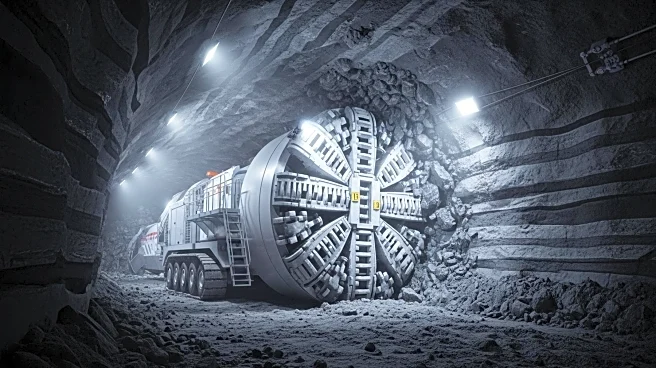What's Happening?
Elon Musk's Boring Co., known for its tunneling and infrastructure projects, has been accused by Nevada regulators of violating state environmental regulations nearly 800 times. These violations occurred during the expansion of a tunnel network under Las Vegas. Despite an agreement signed in 2022 to comply with state laws, the company reportedly continued to breach regulations, including unauthorized digging, improper water disposal, and inadequate site management. The Nevada Division of Environmental Protection initially considered fines exceeding $3 million but reduced them to $242,800 by grouping violations. The decision aims to deter future non-compliance while acknowledging the company's efforts to address the issues.
Why It's Important?
The allegations against Boring Co. highlight significant challenges in balancing infrastructure development with environmental protection. The expansion of the Las Vegas tunnel system, intended to enhance urban transportation, faces scrutiny over its environmental impact. This situation underscores the importance of regulatory compliance in large-scale projects, which can affect public trust and project viability. The reduced fines suggest a compromise between penalizing non-compliance and encouraging corrective actions. The case may influence future regulatory approaches and corporate practices in infrastructure development, particularly in environmentally sensitive areas.
What's Next?
The Boring Co. is expected to address the violations and improve compliance with environmental regulations as it continues its Las Vegas tunnel expansion. The company may face increased oversight from Nevada regulators to ensure adherence to state laws. Stakeholders, including local government and environmental groups, will likely monitor the company's actions closely. The incident may prompt discussions on strengthening regulatory frameworks and enforcement mechanisms to prevent similar issues in future projects. Additionally, the company might need to reassess its operational strategies to align with environmental standards and public expectations.
Beyond the Headlines
The situation raises broader questions about the ethical responsibilities of companies in infrastructure development. It highlights the tension between rapid technological advancement and sustainable practices. The Boring Co.'s case could lead to increased advocacy for stricter environmental regulations and more transparent corporate accountability. Long-term, this may influence industry standards and encourage innovation in environmentally friendly construction techniques. The incident also reflects the growing public awareness and demand for sustainable development, which companies must navigate to maintain their social license to operate.











